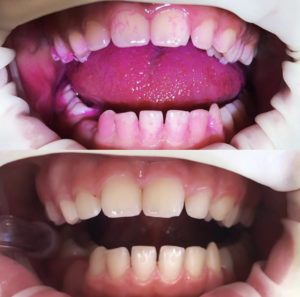What Causes Gum Disease?
Gum disease can occur when your teeth become infected and plaque/calculus builds up and spreads over time. Gum disease is very common and can occur at any age.
Types of Gum Disease
Failure to brush properly can lead to inflammation of the gums known as gingivitis.
Gingivitis can cause the gums to recede from your teeth, exposing the root surfaces and leaving tiny pockets at the base of the tooth. These pockets further complicate the cleaning process and can lead to more extensive inflammation and infection.
Periodontitis is a more severe form of gum disease caused by calculus/tartar buildup irritating the bones surrounding the teeth. The pockets at the base of the teeth caused by gingivitis can deepen and expose the root. Once this happens, the teeth may loosen and even fall out. Your dentist may need to remove the affected tooth.
How well are you brushing?
You may brush twice a day, but how do you know your toothbrush is reaching the right spots?
Our plaque detector is a great way to show you how well you are brushing.
Completely safe for the mouth. Your hygienist will apply the indicator at the start of the appointment. She will then show you the spots that are missed and help offer options to improve your oral hygiene.
After your cleaning appointment, you will be able to see the removal of all the plaque (indicated in the purple dye).
Symptoms
Gum disease can be difficult to identify. The following symptoms should alert you to the presence of gum disease:
- Bleeding gums, particularly when brushing teeth
- Swollen, red gums
- Discomfort
- Bad breath
- Unpleasant taste
- Loose teeth and abscesses
Risk Factors
People who lack proper oral hygiene are at particular risk for gum disease. Also at risk are those with braces, dentures, misaligned teeth, and daily habits such as smoking and tobacco consumption.
Treatment and Prevention
If you experience symptoms of gum disease, it is important to visit your dentist for an examination and treatment. Gum disease usually requires a thorough cleaning and possible deep scaling. Deep Scaling is required in cases of periodontitis to remove the plaque and tartar buildup. In advanced cases, surgery may be required.
Your dentist will help you decide on a oral hygiene practice tailored to your individual needs. This may include certain styles of toothbrushes, instruction on the methods of brushing your teeth and any helpful products. Gum disease can easily be prevented by maintaining proper oral hygiene.
Come and see us to get started on your Oral Health Plan.



